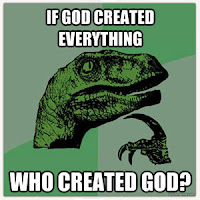The Question/Challenge
A fairly common question that I hear many atheists raise against any form of theism is "Who created God?" I've noticed that this question often comes around after a theist has presented the Kalam Cosmological Argument (KCA):1. Everything that begins to exist has a cause.
2. The universe began to exist.
3. Therefore, the universe had a cause.
Even though the KCA merely concludes that the universe had a cause, the atheist wishes to undermine the theist when they use other arguments (such as the moral argument or teleological argument) to identify the cause as God. The question is designed to show that even God has a cause, and His cause had a cause, which also had a cause, etc. This could go on forever, thus requiring an infinite regress of causes. If, this challenge holds up, then it is a powerful argument against God's existence. So it does warrant a close examination. I have a couple of observations that I wish to bring to light about this challenge.
An Infinite Regress
First, there is a good point being implied with such a challenge: No worldview can have an infinite regress of causes.* All worldviews must have some eternal entity. Some people (atheists) believe the universe is that eternal entity (it has existed forever), some people (other atheists) believe that there is a multiverse that eternally exists outside of our universe that caused our universe, and others (theists) believe that God is the eternal entity that exists outside the universe and created the universe. The power from this challenge comes from our understanding that infinite regresses are not possible. The implication that the theist is not allowed an eternal entity while the atheist IS allowed one, seems awfully dishonest. But that may not be the intention of the atheist. Which leads me to my second point:Created Gods
God is the eternal entity that theists posit in their worldviews. When the atheist asks "who created God", perhaps they are saying that God had a beginning. Unfortunately, for this to be a critique that applies to ANY of the theistic worldviews, those worldviews would have to teach that God is a created entity. One may examine the scriptures of the three major theistic worldviews (Judaism, Christianity, and Islam), and they will not find anywhere that states that God was created. In fact, they all state that God is eternal. So, this critique, though devastating to worldviews that teach god is created, does not apply to worldviews that teach that God is NOT created.Anytime that an atheist is debating a Christian, they cannot honestly bring up this challenge. When (if) it is, though, the theist can quickly correct the misunderstanding for the audience and move on.
Who's Arguing for What Now?
Unfortunately, the challenge does not always end there. The atheist may still insist that the challenge does apply- that God MUST be created. At this point they are not allowing the theist to have an eternal entity in their worldview unless that eternal entity is not God. But, if the atheist is not allowing God as part of the worldview they are critiquing, they are not critiquing theism. They are, in fact, critiquing their own atheism. In the event that an atheist does not immediately recognize that the challenge does not apply to the worldview they wish to challenge, the theist can always take their response to this next level of showing that the atheist is arguing against their own worldview.The question of "who created God" is common, and it does hold persuasive power with people against God's existence. But when investigated, it is understood to not apply to theism, and when examined deeper, it turns out to be a powerful argument against atheism.
*This is established by arguments against the existence of actual infinities. It, of course, assumes that time and cause is not cyclical, but linear. In worldviews where time and cause loop back around on themselves, events and causes can have a relationship where the "first cause" is caused by the "last event"- meaning that there is no real "first" cause or "last" event. Many eastern worldviews posit cyclical time and cause, so they would not fall victim to this critique by atheists or theists, without first overcoming the idea of cyclical time and cause.

